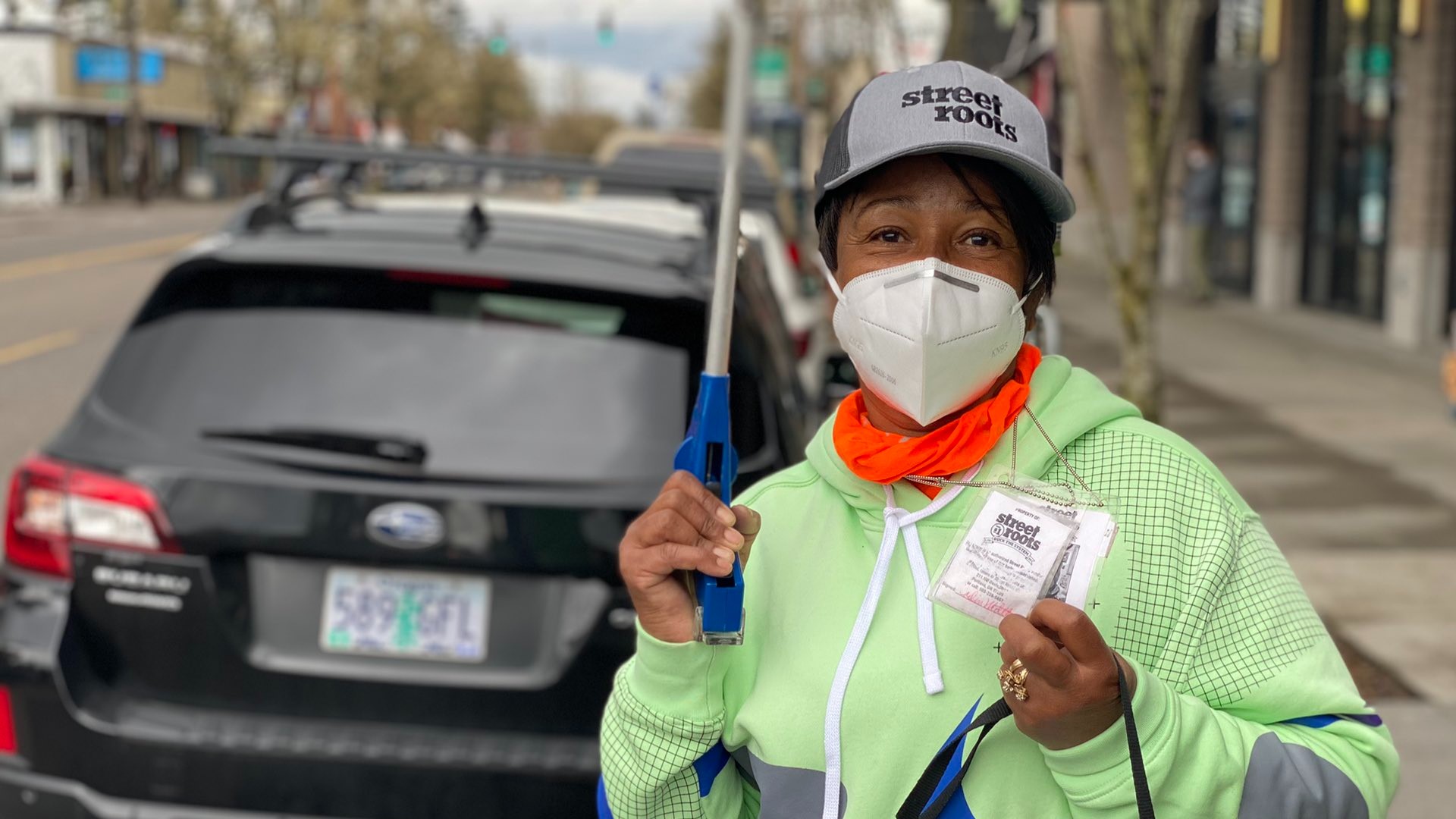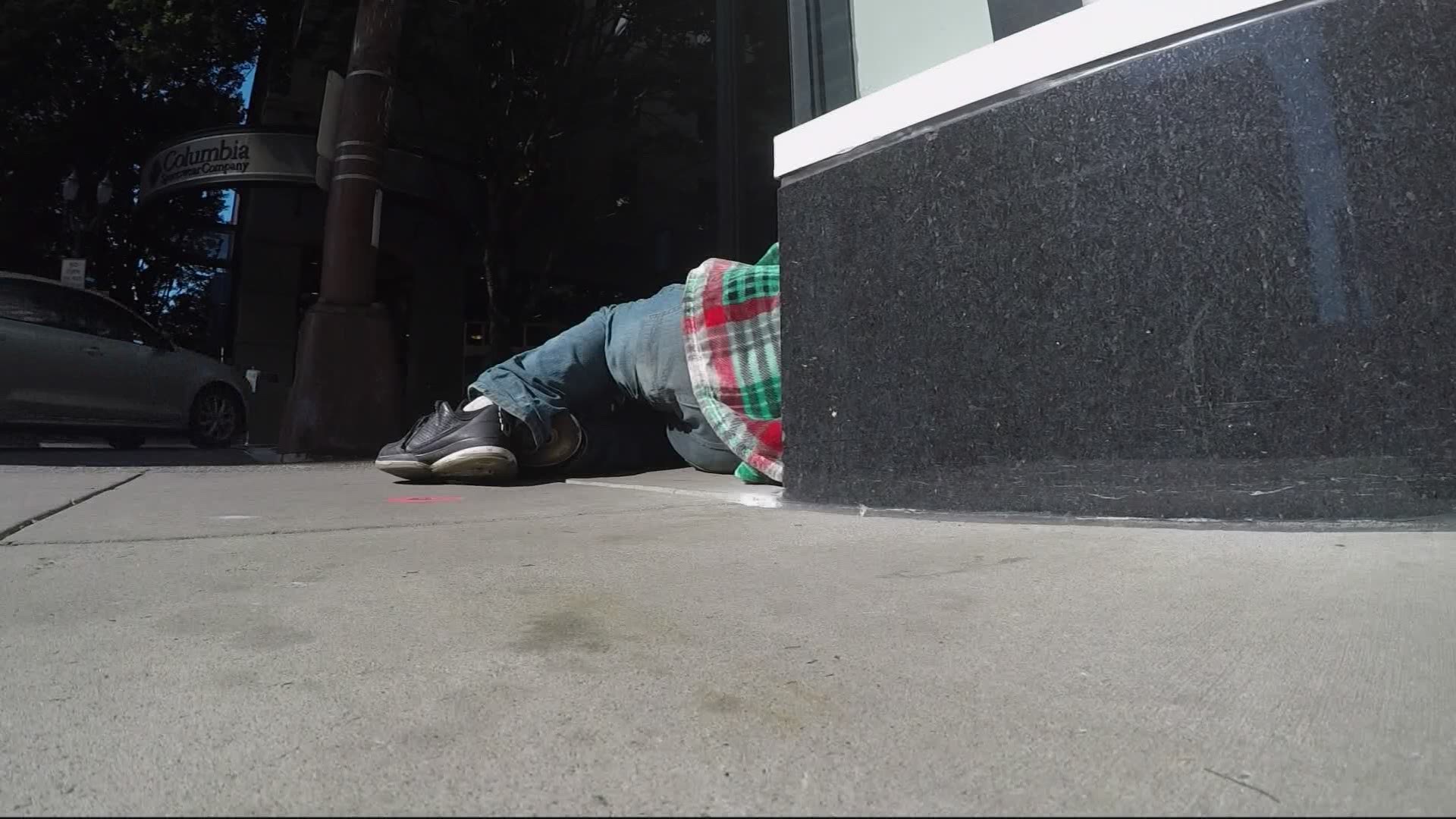'It's common sense': In vaccinating Portland's homeless, ambassadors will be key
After a number of counties moved up in eligibility earlier this week, all homeless people in Oregon will be able to sign up for a vaccine appointment Monday.

Dressed in a lime green sweatshirt and her logo-emblazed Street Roots hat, Nettie Johnson stood in front of the Woodstock New Seasons Thursday and did what she’s done for years. She sold papers, with her dog Sunny Boy by her side.
But this day was different.
“I almost missed my vaccine. I thought it was today. It was yesterday,” she said, laughing about the moment when she saw the appointment alert on her phone. “I went straight to the convention center. I got there at 9:30. By 10:10, I was out the door with my vaccine. Pfizer.”
Due to underlying health conditions, Johnson was deemed high-risk. She’s also, in her words, “African, descended from slavery.” Friends and relatives have told her they’re nervous to get vaccinated. She was, too.
Now, she’s planning on telling everyone her story.
“I have a friend that died from this. She was in the first group, same age, in New York, and she's a fighter. So I said if it took her out, it could take anybody out,” she said. “I'm not going to sit around and die, waiting around to die when they've got something to help me. It's common sense.”
Johnson telling her story, especially in her capacity with Street Roots, is something county officials are banking on headed into next week.
VACCINATING THE HOMELESS
After a number of counties advanced to Group 6 of Phase 1B this week, noting they had empty appointments lingering for days, all of Oregon will expand vaccine eligibility to that group Monday.
The group includes food processing workers, migrant and seasonal farm workers and, among others, Oregon’s homeless.
Multnomah County, the state’s most populated county, is undeniably ground zero for the state’s housing crisis, with more than 4,000 people experiencing homelessness, according to the last Point In Time Count, conducted in 2019. Officials postponed a count scheduled for 2021 due to the concerns about COVID. So while rates of homelessness have clearly risen since the pandemic began, there’s no new data to back that up.
Those staggering numbers in mind, officials are in the midst of developing a complex plan to vaccinate Multnomah County’s homeless, said communicable disease director Kim Toevs.
“This is not something that we're going to have done in three to four weeks,” Toevs said in an interview Thursday.
Multnomah County Health, Toevs said, is partnering with a slew of nonprofits, including Street Roots, Outside In, Cascadia Behavioral Health and Wallace Portland. They'll help people experiencing homelessness sign up for appointments and get to them. When booking appointments, people can use the addresses of nonprofits. They, like anyone else, can leave the social security number box blank. The state’s sign-up system asks for it but does not require it.
Officials in Multnomah County will be able to base parts of their system off of what’s worked well in smaller counties, who began vaccinating their homeless populations this past Monday. A spokesperson for Marion County Health, for example, said 55 people experiencing homelessness got at least one dose of the vaccine this week.
Providers will, Toeves noted, prioritize vaccinating people experiencing homelessness with the one-dose Johnson & Johnson vaccine, since getting them back for a second shot of Moderna or Pfizer will likely prove a major hurdle.
But, for now, that strategy only goes so far.
“We're not getting as much of that vaccine into our state right now as we had hoped to,” Toevs said. “So for now I think our focus will be to use the two-dose vaccines that we have available and map out and work through the shelters.”
For those who can't travel to a vaccination site, or don’t feel comfortable doing so, Toevs predicts pop-up clinics and street teams bringing doses to camps.
“We're going to need to do some special work to bring the vaccine to where people are at or to where people get services already that they trust,” she said.
VACCINE AMBASSADORS
In the meantime, educating people living on Multnomah County’s streets and in shelters will be crucial. That’s where people like Nettie Johnson come in.
The Street Roots newspaper, which focuses on Oregon’s housing crisis and is sold primarily by homeless street vendors, just signed on for a formal partnership with the Joint Office of Homeless Services. She and her fellow vendors will, in turn, serve as ambassadors for vaccinating Multnomah County’s homeless population.
The gig, Johnson said, will likely entail things like walking between trails and camps, helping people sign up for appointments and, in general, explaining to them why getting vaccinated is so important.
Johnson even said Thursday she’d like to be stationed at the Oregon Convention Center, greeting homeless people as they come to get their vaccine.
“We need to kind of like get them in their own slot,” she said. “As homeless people, we tend to stick together and support each other.”


